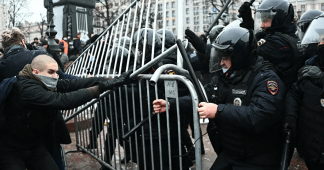By Daniel Larison
Mar. 11, 2021
The Atlantic Council recently published a report on Russia policy written by Emma Ashford and Mathew Burrows, and soon after the report came out almost two dozen people from the same think tank issued a dismissive denunciation that seriously misrepresented the arguments contained in the report. The people attacking Ashford and Burrows have made fools of themselves in the process, and they compounded the original error by attacking Ashford and Burrows again in anonymous statements to Politico. You could scarcely ask for a better example of how stifling groupthink restricts and distorts foreign policy debate than this. The good news in this case is that the denouncers have behaved so shamefully that their attack has backfired on them.
One of the statement’s signatories did at least make the effort of responding with his own arguments, but even this response is mostly talking past what Ashford and Burrows said. Dylan Myles-Primakoff makes a big deal about their supposed errors of fact about Navalny and his views, but they aren’t wrong in their description of Navalny’s positions. Navalny is a Russian nationalist, as many others have said in the months since the Russian government tried to have him killed. His nationalism has apparently moderated and changed over time, but it is still correct to call him a nationalist. That does not make his criticisms of Putin and the government less valid, but it is worth keeping in mind that a more democratic Russia will nonetheless be a nationalist one with continuity in how it defines its security interests. This is the point that Ashford and Burrows were making, and it is a perfectly reasonable and accurate observation.
There is an unexamined assumption among many Western critics of Russian foreign policy that a change in government would result in a more accommodating Russia, and Ashford and Burrows are appropriately skeptical about this. As they say, “Broader academic research on regime change indicates that it does not typically alter a nation’s foreign policy orientation.” A state’s security interests remain much the same regardless of regime type. That understanding informs their recommendations to call for a less ambitious Russia policy that recognizes the limits of U.S. influence.
On the question of Crimea, Navalny has said both that Crimea will not be returned to Ukraine and that it was taken in violation of international norms. A review of Navalny’s relevant statements from earlier this year reached this conclusion:
“While criticising Putin’s regime mainly over domestic issues, there is a little reliable indication that he would dramatically alter Russia’s policies towards Ukraine, at least regarding Crimea.”
Navalny’s nationalism and his racist attitudes towards people from the Caucasus help to account for why he supported Russia in its August 2008 war with Georgia:
“He also supported Russia in its war against Georgia in August 2008, using a derogatory term for Georgians in some of his blog posts and calling for all Georgians to be expelled from Russia. He has since apologized for using the racist epithet, but says he stands by the other positions he took at that time.”
One can argue that Navalny is a more effective opposition figure because he is a nationalist, but one cannot then deny that his nationalism will lead him to take positions on foreign policy that are not significantly different from the government’s own policies. The point that Ashford and Burrows make is that democratization will not be a cure-all for problems in the U.S.-Russian relationship, nor will it necessarily lead to significant changes in Russian policies. Indeed, I would add that one of the big mistakes that the U.S. made in the post-Soviet period was to assume that a non-communist Russia would be a pliant, subservient part of a U.S.-led order. We have seen over the last twenty-five years that this assumption was wrong. Russia hawks are eager to ignore the role of U.S. policy mistakes in contributing to the breakdown in relations with Moscow, because remembering these mistakes will remind everyone that the hawks have consistently misjudged Russia for the last thirty years.
Possibly the most important part of Ashford and Burrows’ report is their recognition of the futility of sanctions and the need to offer incentives to obtain greater cooperation from Russia on shared interests. U.S. and EU sanctions have not changed the Russian government’s behavior at all. Ashford and Burrows are urging our government to acknowledge that piling on more sanctions will be useless and to refrain from relying on this ineffective tool. They take a very moderate position on this point, and they don’t even call for lifting existing sanctions, but they do want us to see that more sanctions aren’t the answer.
Ashford and Burrows conclude their report this way:
“To be clear, there is little hope of improvement in the US-Russia relationship and no prospect of a “reset.” Nonetheless, stabilization would be preferable to the status quo. A more realistic approach to Russia–one that deprioritized human rights and prioritized concrete U.S. interests–could lower tensions, create effective deterrence on critical issues, and allow the United States to reengage on topics of mutual interest.”
This is an eminently sensible and reasonable position to take. Ashford and Burrows’ report is an important contribution to the debate on the future of U.S. policy towards Russia. The Biden administration would do well to follow their recommendations.
Published at daniellarison.substack.com










